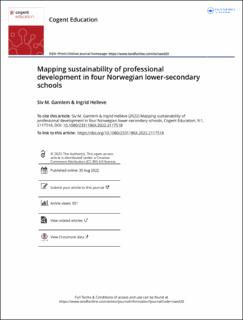Mapping sustainability of professional development in four Norwegian lower-secondary schools
Peer reviewed, Journal article
Published version
Permanent lenke
https://hdl.handle.net/11250/3050738Utgivelsesdato
2022Metadata
Vis full innførselSamlinger
Sammendrag
The aim of this study was to investigate how principals (n = 4) and teachers (n = 20) from four lower-secondary schools perceived and evaluated sustainable professional development processes in their schools. To understand their experiences and perceptions, interviews and focus group conversations were conducted at the end of a one-year research and development project and again two years later. All teachers had in common that they taught 9th graders (14–15-year-old students) in Mathematics. Findings indicate that at the end of the common project period, all the participating teachers state that they had experienced professional development. They had made changes to their teaching practice and were collaborating more with colleagues. After two years the teachers still state that the research and development project had contributed to their learning, but that their schools have not been able to maintain a context of sustainable professional development processes. The core finding from this study suggests that if professional development in schools is to be sustainable, teachers should have ownership, work in teams over time and gain necessary support by their leaders and external experts for facilitating the learning processes and to develop new knowledge. Both the principals and teachers in these four schools claimed that to maintain sustainability of a continuing professional development there is a need to find time and structures to reflect on teaching practices and student learning.
